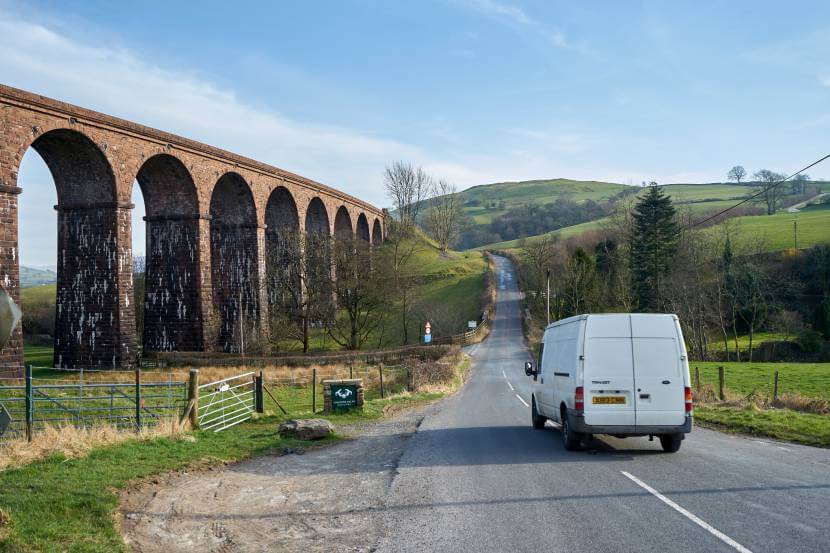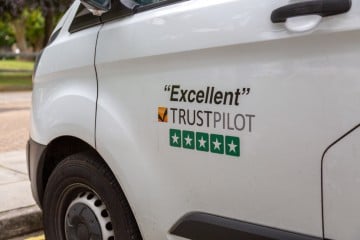You can find out if your van has valid insurance by entering your reg number at askMID. It's the same process if you're checking whether your car is insured.
Your van must have valid van insurance for as long as it's on the road. And the consequences of driving without van insurance can be serious.
Here are some simple ways you can check if your van is insured and who you're insured with.

How do I check if I have van insurance?
The quickest way to find out if your van is insured is to check with the Motor Insurance Database (MID).
They have a useful tool to help you check if your van is insured.
Here's how it works:
- Enter your van's registration number
- Check the box to agree to their data protection terms and check the 'I'm not a robot' box
- Select 'Check this vehicle'
If your van is insured, you should then see, "YES. This vehicle is showing as INSURED on the Motor Insurance Database today."
The tool also tells you the make and model of the van.
If your van doesn't have a valid insurance policy, you should see, "NO. This vehicle is NOT showing as insured on the Motor Insurance Database today."
If these details are wrong, you should contact your insurer - once you’ve found them - to inform them of the mistake.
The consequences of driving a van without insurance can be severe. Anyone caught driving a car or van without the proper insurance could face a hefty fine, points on their licence or even a ban.
So it's vital you check your van is insured before driving.
If you want to know who your van is insured with because you're thinking of switching at your renewal, be patient. So long as the MID confirms that your van is insured, you can expect to hear from your current insurer around 3 weeks before your renewal date.
At this point, it's worth shopping around to see if you can get a cheaper van insurance quote from another insurer. Even if your renewal price is roughly the same - or even less - than last year, it's still worth comparing van insurance quotes.
How do I check who my van insurance is with?
Here's a quick list of where to look for the name of your insurer:
- Emails - search for 'insurance'
- Post - any recent letters with your policy details
- Bank statements - look for a large, lump sum sometime in the past 12 months
Most insurance companies send out paperwork like policy documents and renewal notices by email. So start by looking through your inbox and searching for words like ‘insurance’, ‘van insurance’ or ‘renewal’.
If your insurer still contacts you through the post, look for any recent letters confirming your policy details. This should also tell you when your renewal date is.
If you still can't find it, have a look at your bank statement. You should see either a lump sum going out to your insurer at the start of the insurance period or as monthly direct debit payments.
If your last lump sum payment was over 12 months ago, or if your insurance direct debits have stopped, it’s likely your cover has ended.
Once you've found out who your van insurance is with, set yourself a reminder. You can do this by sending yourself a calendar event or an email with:
- The name of your van insurance company
- Your policy number
- The date your van insurance expires
Make sure you use the words 'van insurance' and maybe also 'policy' in the email. That way you can search your inbox in future and get all the information you need straight away.
What if my van doesn't have insurance?
You need to get van insurance as soon as possible. If this won't happen for some time, you need to take the van off the road with a Statutory Off-Road Notification (SORN).
The consequences of being caught driving without insurance can be potentially disastrous, especially if you use your van as part of your job.
If you’re caught driving without insurance, you could:
- Get a fixed penalty notice
- Be fined £300
- Get 6 points added to your licence
Penalty points on your van licence also increase your insurance costs in the future.
If the police think an offence is particularly serious they may take the case to court. For example, if you're suspected of providing false information. If this happens, the potential fine is unlimited.
You could also face a ban or permanent disqualification from driving. And the potential problems don’t stop there.
When you buy van insurance in the future, you have to declare the incident. This is likely to increase the cost of your van insurance for years to come.
The police also have the power to seize and even destroy your vehicle – although this usually only happens in exceptional circumstances.
Do I need to insure my van if I’m not using it?
Yes – the legal requirement to have insurance applies to all vehicles, whether they’re being used regularly or not.
If you're not using your van and so don't want to insure it, you need to officially declare it as off the road. This involves applying for a SORN through the DVLA.
Getting a SORN means you no longer need to tax or insure your van and there's no legal requirement to have an up-to-date MOT.
If your van has a SORN, it’s against the law to drive it at any time on public roads. That's unless you’re heading to a pre-booked MOT test.
Also, with a SORN you have to store the vehicle on private property. For example, you’re not allowed to keep it parked on the street.
Compare cheap van insurance quotes
Get a quote






